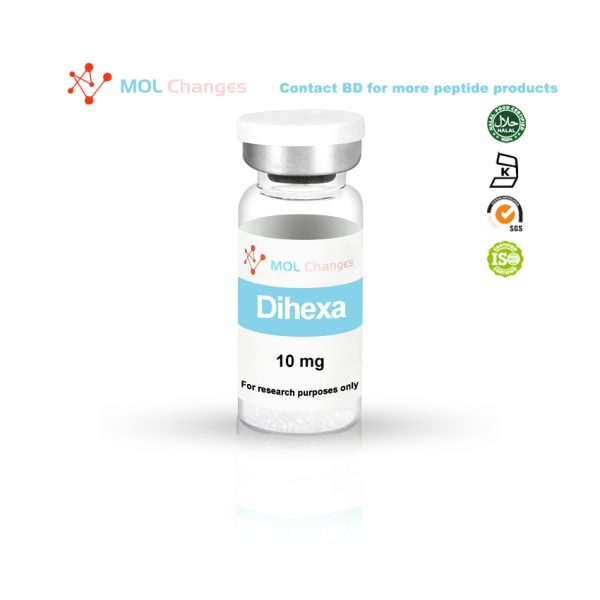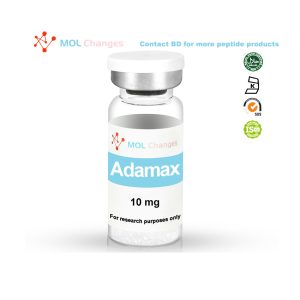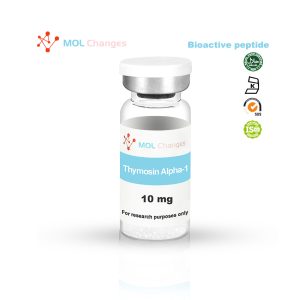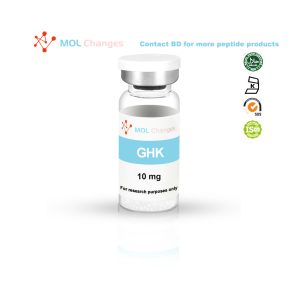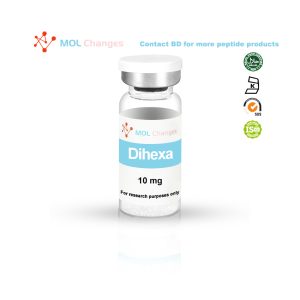Dihexa (PNB-0408), an oligopeptide reagent, is an orally active, blood-brain barrier permeable angiotensin IV analog.
Dihexa binds hepatocyte growth factor (HGF) with high affinity, has a ChemicalbookKd value of 65 pM, and enhances its activity on the receptor c-Met.
Dihexa showed excellent antipsychotic activity as well as improved cognitive function in animal models.Dihexa has potential for the study of Alzheimer’s disease.
Sequence
hexanoyl-Tyr-Ile-Unk
CAS Number
1401708-83-5
Molecular Formula
C27H44N4O5
Molecular Weight
504.7
What is Dihexa Peptide?
Dihexa peptide is a synthetic peptide compound that has gained significant attention in recent years for its potential cognitive-enhancing properties. It was originally developed as a compound to aid in the treatment of Alzheimer’s disease and other neurodegenerative disorders. However, its unique mechanism of action and impressive results have piqued the interest of researchers and individuals seeking cognitive enhancement.
Mechanism of Action
Dihexa peptide works by binding to hepatocyte growth factor (HGF), a protein that plays a crucial role in the growth, repair, and survival of neurons in the brain. By binding to HGF, Dihexa enhances the activity of the protein, leading to increased neurogenesis and synaptogenesis – the growth of new neurons and synapses, respectively. This process is essential for learning, memory formation, and overall cognitive function.
Moreover, Dihexa peptide has shown the ability to cross the blood-brain barrier, a protective barrier that prevents many substances from entering the brain. This unique characteristic ensures that Dihexa can reach its target in the brain and exert its cognitive-enhancing effects directly.
Benefits of Dihexa Peptide
1. Improved Memory and Learning: Dihexa has been shown to significantly enhance memory and learning abilities. By stimulating neurogenesis and synaptogenesis, it promotes the formation of new neural connections, which is crucial for memory consolidation and the acquisition of new information.
2. Neuroprotective Effects: Dihexa peptide exhibits potent neuroprotective properties. It helps protect neurons from oxidative stress, inflammation, and other damaging factors, thereby potentially reducing the risk of neurodegenerative diseases and age-related cognitive decline.
3. Enhanced Cognitive Function: Individuals using Dihexa have reported enhanced cognitive function, including improved focus, attention, and mental clarity. These effects can be particularly beneficial for students, professionals, and anyone looking to optimize their cognitive abilities.
4. Potential Treatment for Neurological Disorders: Dihexa shows promising potential as a therapeutic agent for various neurological disorders. Studies have indicated its efficacy in animal models of Alzheimer’s disease, Parkinson’s disease, and traumatic brain injury. Further research is underway to explore its potential applications in humans.
Usage and Dosage
Dihexa peptide is typically administered through subcutaneous injections. The optimal dosage may vary depending on the individual’s specific needs and goals, and it is crucial to consult with a healthcare professional or medical practitioner experienced in peptide therapy to determine the appropriate dosage.
Safety and Side Effects
While Dihexa peptide has shown significant potential for cognitive enhancement, it is essential to consider safety. Currently, limited human studies have been conducted, and the long-term effects of Dihexa on human subjects are still not fully understood. As with any compound, it is advisable to consult with a healthcare professional before considering Dihexa peptide supplementation.
COA
HPLC
MS

- Gard PR. Cognitive-enhancing effects of angiotensin IV. BMC Neurosci. 2008;9Suppl 2:S15.
- Benoist CC, Wright JW, Zhu M, Appleyard SM, Wayman GA, Harding JW. Facilitation of hippocampal synaptogenesis and spatial memory by C-terminal truncated Nle1-angiotensin IV
- analogs. J Pharmacol Exp Ther. 2011 Oct;339(1):35-44. doi: 10.1124/jpet.111.182220. Epub 2011 Jun 30. PMID: 21719467; PMCID: PMC3186286
- Wright JW, Harding JW. The Brain Hepatocyte Growth Factor/c-Met Receptor System: A New Target for the Treatment of Alzheimer’s Disease. J Alzheimers Dis. 2015;45(4):985-1000. doi: 10.3233/JAD-142814. PMID: 25649658.
- Doeppner TR, Kaltwasser B, Elali A, Zechariah A, Hermann DM, Bähr M. Acute hepatocyte growth factor treatment induces long-term neuroprotection and stroke recovery via mechanisms involving neural precursor cell proliferation and differentiation. J Cereb Blood Flow Metab. 2011;31(5):1251-62.
- Wright JW, Kawas LH, Harding JW. The development of small molecule angiotensin IV analogs to treat Alzheimer’s and Parkinson’s diseases. Prog Neurobiol. 2015 Feb;125:26-46. doi: 10.1016/j.pneurobio.2014.11.004. Epub 2014 Nov 29. PMID: 25455861.
- Wright JW, Harding JW. The angiotensin AT4 receptor subtype as a target for the treatment of memory dysfunction associated with Alzheimer’s disease. J Renin Angiotensin Aldosterone Syst. 2008 Dec;9(4):226-37. doi: 10.1177/1470320308099084. PMID: 19126664.
- McCoy AT, Benoist CC, Wright JW, Kawas LH, Bule-Ghogare JM, Zhu M, Appleyard SM, Wayman GA, Harding JW. Evaluation of metabolically stabilized angiotensin IV analogs as procognitive/antidementia agents. J Pharmacol Exp Ther. 2013 Jan;344(1):141-54. doi: 10.1124/jpet.112.199497. Epub 2012 Oct 10. PMID: 23055539; PMCID: PMC3533412.
- Benoist CC, Kawas LH, Zhu M, Tyson KA, Stillmaker L, Appleyard SM, Wright JW, Wayman GA, Harding JW. The procognitive and synaptogenic effects of angiotensin IV-derived peptides are dependent on activation of the hepatocyte growth factor/c-met system. J Pharmacol Exp Ther. 2014 Nov;351(2):390-402. doi: 10.1124/jpet.114.218735. Epub 2014 Sep 3. PMID: 25187433; PMCID: PMC4201273.
- Salehi Z, Rajaei F. Expression of hepatocyte growth factor in the serum and cerebrospinal fluid of patients with Parkinson’s disease. J ClinNeurosci. 2010;17(12):1553-6
- Pederson ES, Krishnan R, Harding JW, Wright JW. A role for the angiotensin AT4 receptor subtype in overcoming scopolamine-induced spatial memory deficits. RegulPept. 2001;102(2-3):147-56.
- Albiston AL, Fernando RN, Yeatman HR, et al. Gene knockout of insulin-regulated aminopeptidase: loss of the specific binding site for angiotensin IV and age-related deficit in spatial memory. Neurobiol Learn Mem. 2010;93(1):19-30.
- Hamasaki H, et al. Down-regulation of MET in hippocampal neurons of Alzheimer’s disease brains. Neuropathology. 2014 Jun;34(3):284-90.
Article/Literature Citation Notes
The purpose of quoting the scientist and professor's article is to acknowledge, recognise and applaud the exhaustive development work that has been done to undertake this peptide research. The scientist does not in any way support or advocate the purchase, sale or use of this product for any reason, and MOL Changes has no affiliation or relationship, implied or otherwise, with the scientist.
warning
These products are intended for scientific purposes only for in vitro research and are not to be used for human, animal or unethical experiments, in vitro research (Latin: in glass) is conducted in vitro. These products are not drugs and are not approved by the Food and Drug Administration in any country for the prevention, treatment or cure of any medical condition, disease or illness. The introduction of this product into humans or animals in any form is strictly prohibited by law.


